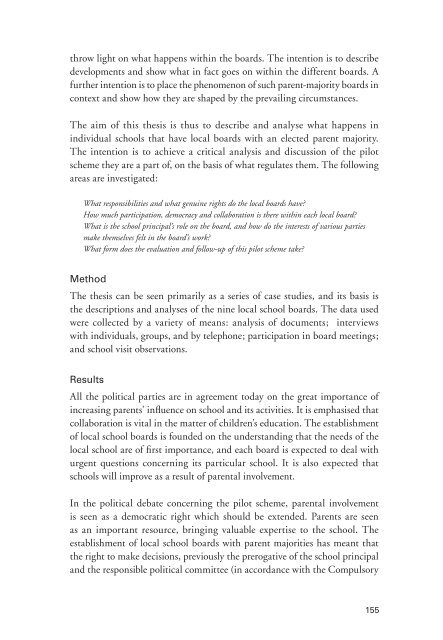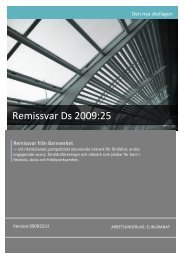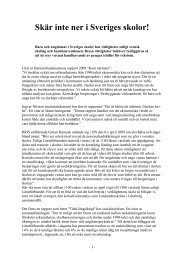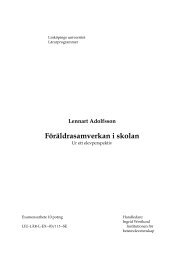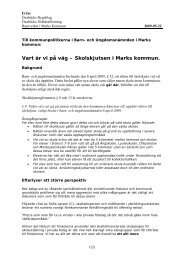Föräldrainflytande i grundskolan - Barnverket
Föräldrainflytande i grundskolan - Barnverket
Föräldrainflytande i grundskolan - Barnverket
Create successful ePaper yourself
Turn your PDF publications into a flip-book with our unique Google optimized e-Paper software.
throw light on what happens within the boards. The intention is to describe<br />
developments and show what in fact goes on within the different boards. A<br />
further intention is to place the phenomenon of such parent-majority boards in<br />
context and show how they are shaped by the prevailing circumstances.<br />
The aim of this thesis is thus to describe and analyse what happens in<br />
individual schools that have local boards with an elected parent majority.<br />
The intention is to achieve a critical analysis and discussion of the pilot<br />
scheme they are a part of, on the basis of what regulates them. The following<br />
areas are investigated:<br />
What responsibilities and what genuine rights do the local boards have?<br />
How much participation, democracy and collaboration is there within each local board?<br />
What is the school principal’s role on the board, and how do the interests of various parties<br />
make themselves felt in the board’s work?<br />
What form does the evaluation and follow-up of this pilot scheme take?<br />
Method<br />
The thesis can be seen primarily as a series of case studies, and its basis is<br />
the descriptions and analyses of the nine local school boards. The data used<br />
were collected by a variety of means: analysis of documents; interviews<br />
with individuals, groups, and by telephone; participation in board meetings;<br />
and school visit observations.<br />
Results<br />
All the political parties are in agreement today on the great importance of<br />
increasing parents’ influence on school and its activities. It is emphasised that<br />
collaboration is vital in the matter of children’s education. The establishment<br />
of local school boards is founded on the understanding that the needs of the<br />
local school are of first importance, and each board is expected to deal with<br />
urgent questions concerning its particular school. It is also expected that<br />
schools will improve as a result of parental involvement.<br />
In the political debate concerning the pilot scheme, parental involvement<br />
is seen as a democratic right which should be extended. Parents are seen<br />
as an important resource, bringing valuable expertise to the school. The<br />
establishment of local school boards with parent majorities has meant that<br />
the right to make decisions, previously the prerogative of the school principal<br />
and the responsible political committee (in accordance with the Compulsory<br />
155


